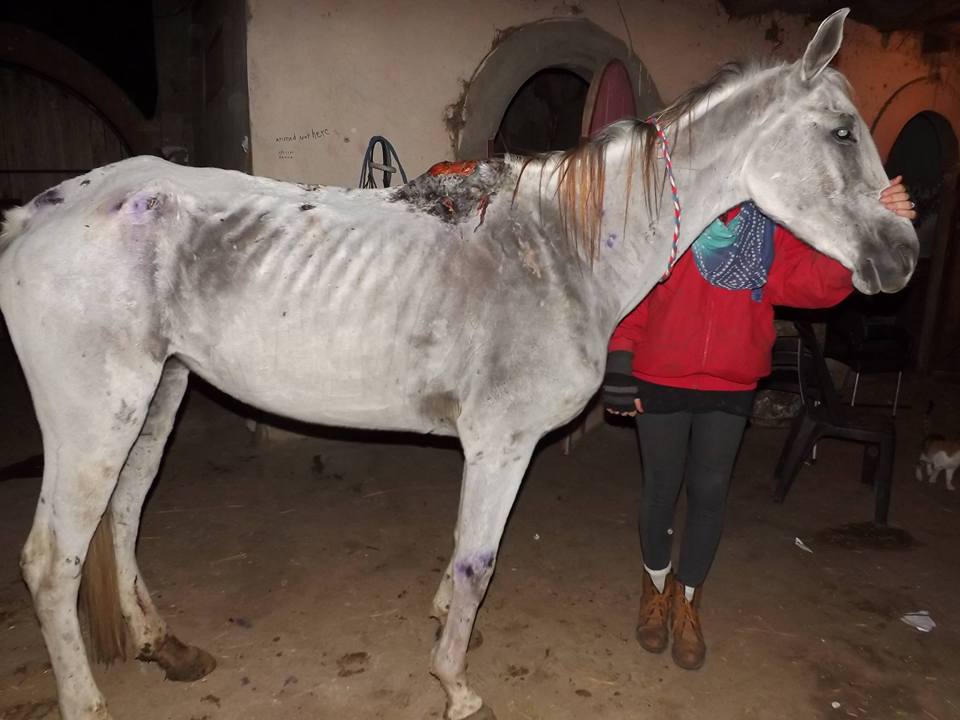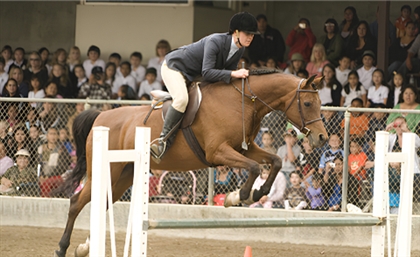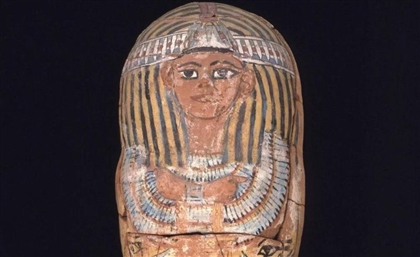Egypt: Where Donations Can Lead to Further Animal Abuse
Eihab Boraie delves into the dark world of animal abuse, by those who purport to be their saviours, as the ongoing controversy surrounding the Egyptian Horse Project is underlined by groups committed to shutting down the so-called fraudulent and cruel organisation.

It is nearly impossible to go anywhere in this country without seeing some form of a heart-wrenching animal abuse. From abandoned, heat exhausted animals with protruding ribs to those suffering from years under the whip resulting in festering sores made worse under ill fitting harnesses, the animals of Egypt face extraordinary levels of abuse. Those with big enough hearts try do their part by donating to good intentioned charities or rescue operations. However, good intentions and bad management can result in crueler treatment far more agonising than the conditions in which the animals originally found. To highlight just how important it is to vet the charities/rescue organisations providing the aid, I reached out to a variety of rescue groups and discovered that despite intentions there efficacy ranges from the good, the bad, and the fraudulent.
Evidence of abuse is overwhelming and yet those who feel inspired to act and don’t know how to do so, often relying on the internet and their wallets as a way to help. Sadly, some who do donate look for an initiative with easily searchable names, but don’t investigate into the charities' track records, to actually find out if it is a mismanaged scam furthering abuse. If you were concerned about the treatment of horses and did a quick Google search, you may have stumbled upon the Australian registered charity The Egypt Horse Project (TEHP). On the surface it may seem like an operation that is fighting against insurmountable odds to provide treatment to Egypt’s battered equine. However, if you look further into the TEHP, you will find an entire Facebook group moderated by former founders, who now volunteer their time to report abuses perpetrated by the organisation on the page entitled The Egyptian Horse Project Questions and Concerns Page. Taking the time to explain what went wrong, the admin of the group, who wishes to remain anonymous, tells me that initially “They all agreed that TEHP would be based around providing replacement tack, medication, veterinary visits and feed stations in the Giza area, as taking in or buying horses was too risky. Hannah and Narieda left TEHP when Ashleigh decided to start fostering horses - notably after she took on a horse with laminitis, a crippling condition which often means working horses can never do their jobs again. The Brooke Hospital advised this horse should be put to sleep, as he would never fully return to work without being in pain. Ashleigh went against this advice and instead bought the horse from his owner to rehabilitate him.” The horse that caused the riff within the group was named MJ, and despite numerous appeals to put him sleep, Ashleigh refused resulting in a decision that would change TEHP's mission and ultimately lead to further animal abuse.

Ashleigh and MJ
Initially it appeared that perhaps the group was made of disgruntled volunteers, however the number of abuse cases were overwhelming, the pictures posted too disturbing, and most damning of all was that they weren’t the only ones trying to shut down the project. Heeding the call from the farm next door to TEHP's old facility is Maryanne Ghabbani, founder of Al-Sorat Farms and the Rural Wellness Initiative. According to Ghabbani, “It was never about the horses for her, where at PFK (Princess Fluffy Kareem), operations might have been marginally about horses at one time, but all about how much money a lot of very gullible people would send her for her "heroic work" in the bowels of evil Egypt. She used to post ridiculous stories about the danger she was in and the hardships, saying how nothing was available for her work so people needed to send money and goods to Egypt. Most of this was rubbish and I was banned from the TEHP page for pointing out that many of the things she wanted people to send her were available here and cheaper than in the UK.”
With serious allegations being leveled, it was only fair to contact The Egyptian Horse Project who replied on Facebook explaining: "TEHP is no longer involved in animal rescue in Egypt, two ladies Salwa Abdoh and Mariam Aly are now responsible for the care of current and future rescue animals, TEHP will provide support and funds wherever possible but will not be involved in further rescue cases."
This may come as a relief to some who feel that the pressure against them finally put the project to sleep, however one could argue that the pain of losing MJ to illness, despite the multiple warnings, was more than Ashleigh could bear. Despite the acknowledgement that TEHP is no longer involved the in animal rescue, Ghabbani remains skeptical alleging that “TEHP isn't dead because she's registered it in Australia and until they nail her on fraud, she will continue collecting money. She hasn't been contributing here for years.” As for the animals that have been rescued by Mariam and Salwa, few will question their intentions, however believe their strategy to help is making matters worse.

From the Republic of Mariam and Salwa FB page
At the heart of the criticism is a belief that creates division among animal activists in Egypt; knowing when euthanasia is a humane course of action. In the case of Mariam, Salwa and Nora Khalil, they believe that no animal should be put to sleep regardless of their agonising pain even when there is no chance of recovery. “We discovered that cats and dogs are not the only animals suffering but horses and donkeys and all the animals as well, and it's a shame there is no place that can take care of them in Egypt. There might be a donkey suffering and when they take them anywhere the easiest thing to do is to shoot them,” explains Khalil in a recent television interview.
The issue is not as black and white as Khalil paints, as some animals are beyond recovery and choosing to treat them results in a mismanagement of resources and, in the case of this donkey, seems inhumanely cruel. Medicine and food for animals is extremely expensive and if they are being distributed to those who have no chance of survival or relief from pain, then there is less aid available for those who can recover, let alone feed all the animals. Some will argue that euthanasia of animals suffering is a cultural/religious difference and is prohibited in Islam, however an online search proves that even Islamic leaders are divided on the issue. Whether you strongly believe one way or another, the responsibility will fall on those who donate to make sure that the charity/organisation’s share their own personal philosophy on treatment. Just as varied as opinions are philosophies and strategies deployed. “I think that the rescues that collect animals from the streets to leave them to live in cages and overcrowded facilities with little human contact are no less than abuse. We give rabies shots to farm dogs at our clinics because rabies is fatal to both dogs and humans, but we don't give distemper vaccines because, frankly, too many dogs in the countryside will upset the ecological balance and enough puppies survive these illnesses to provide a strong gene pool for the next generation,” describes Ghabbani.

Retrieved from the Republic of Mariam and Salwa Facebook page
Another cause for alarm is that multiple organizations providing aid have little to no educational background for what they are doing. According to Salwa Abdo “We all have our normal jobs, teacher, accountant and an office manager, but it's not a side project to us it is a 24 hour thing.” None of their professional backgrounds provide them with the tools to know what the proper course of treatment should be. With good intentions and enough devotion these women may over time acquire the education needed to provide effective treatment, but as it stands it seems that they are learning as they go and run the risk of falling into the same mismanagement problems that afflicted TEHP. “Although TEHP said they were downsizing, they then moved to bigger premises out near Sakkara and began working with Salwa and Mariam who bring in even more cases of equines with broken legs, or who are generally beyond repair. These animals continue to suffer with very little veterinary care, or veterinary care that is of a poor standard. Several donkeys have had forelimbs amputated, which elsewhere in the world is simply not an option, even for racehorses worth millions of dollars,” exclaims the admin of the Anti-TEHP campaign.

Retrieved from The Egypt Horse Project - Questions & Concerns Page.
The debate will continue and anger will fester among activists both inside and out of Egypt, but the question remains; How do you ensure that your donations are going to a group making a positive impact and not a scam furthering abuse? Firstly, transparency is of the outmost importance. It should come as a red flag if the organisation cannot keep track of donations and are unwilling to provide you with records of animal vaccinations or the distribution of donations. Secondly, only donate to groups that frequently update their social networks or website with pictures. If the animals look to be getting worse instead of healthier, then clearly something is wrong. If all the animals have protruding ribs that doesn’t seem to change over time, then clearly there is a systemic problem. When the TEHP supposedly stopped their operations most of the horses went to Mariam and Salwa, but in the case of Holly, she went to the Egypt Equine Aid and underwent a dramatically visible recovery.
Holly Before

Holly After

Thirdly, if you live in the same city, try to pay a visit to the farm or group. If they refuse to let you enter then chances are they have something to hide. The sign of a good organisation is one that is always cleaned, and will allow visitors whenever, instead of restricting visits to days in which they stage their premises to appear clean for a day.
These are but a few tips on how to avoid being scammed and by default feeling responsible for unwillingly helping the spread of abuse. Scams exist, but so do people and groups who are actually making a positive impact on animals. If there is any take home message is that wanting to donate is not enough, and that equally important is researching the charities and initiatives BEFORE committing to financial helping. I don’t doubt that everyone mentioned above has a big heart, but caring for animals requires a lot more than good intentions. Without proper education and management those believing they are helping are in fact making matters worse by siphoning donations from groups actually making a positive difference for animals.
- Previous Article J.K.Rowling Speaks to Egyptian Writer
- Next Article Omar Adel: YouTube Bandit
Trending This Week
-
May 01, 2024
























